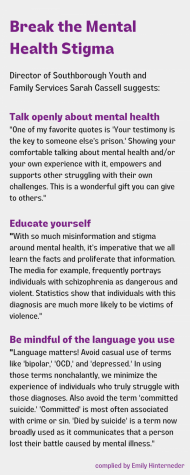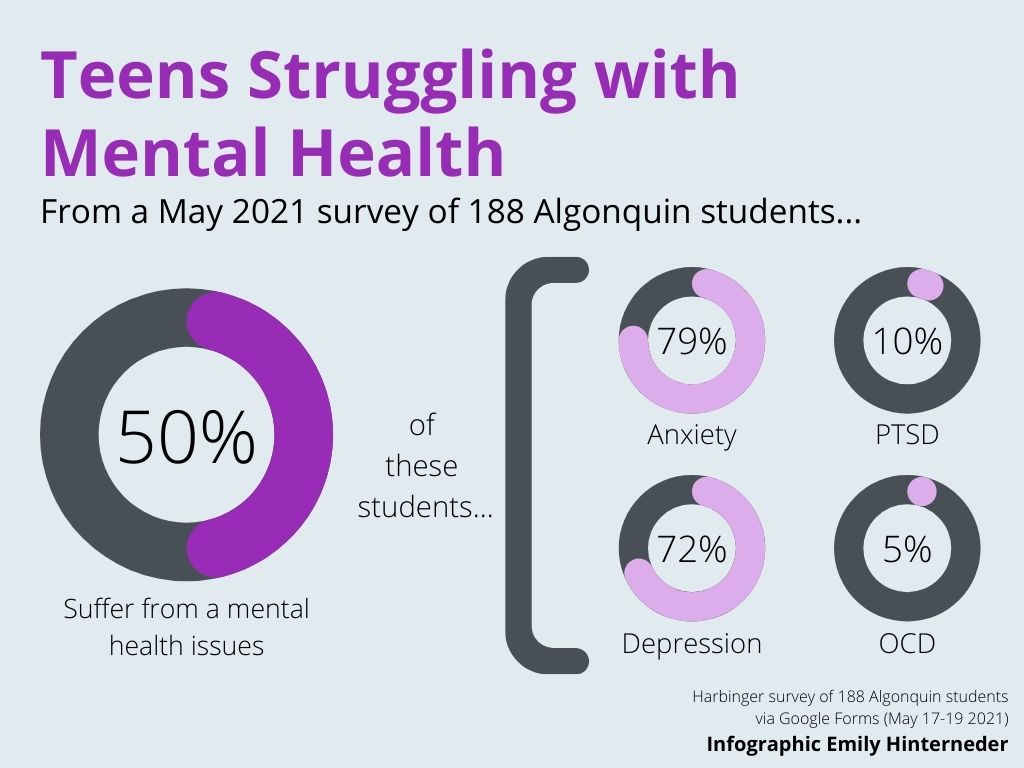A donation of $40 or more includes a subscription to the 2025-26 print issues of The Harbinger. We will mail a copy of our fall, winter, spring and graduation issues to the recipient of your choice. Your donation supports the student journalists of Algonquin Regional High School and allows our extracurricular publication to purchase equipment and cover our annual website hosting costs.
You’re not alone
Students battle mental health in the face of a pandemic
June 20, 2021
Every year since 1949, the American public has considered May the official Mental Health Awareness Month to fight the stigma surrounding mental health issues and help millions of Americans find support for their mental health concerns, which are especially impactful this year due to the widespread negative effects of the COVID-19 pandemic.
Mental health issues are nothing new to the Northborough and Southborough communities, especially in the teenage population, as a significant portion of the Algonquin student body struggles with mental illnesses.
According to a Harbinger survey of 188 students conducted through Google Forms from May 17 to 19, 50% of respondents say they have suffered from some mental disorder in their lifetime, and another 23% have felt symptoms but have been undiagnosed. Of these percentages, 79% of the survey respondents suffer from some form of anxiety, 72% from depression, 10% from PTSD, 5% from OCD and 2% from eating disorders. Many of these students also noted experiencing multiple mental health disorders simultaneously, as well as a wide range of disorders not listed.
Individuals struggling with their mental health are not alone, even in these times of great uncertainty. The isolation and stress imposed on teenagers by the recent pandemic has impacted the mental wellness of many students.
“As social creatures, our inability to seek comfort from each other [during the pandemic] compounded the challenges,” Director of Southborough Youth and Family Services Sarah Cassell said. “For teens, social interaction and independence is a particularly important part of development and the process of forming identity.”
Cassell is also a Licensed Mental Health Counselor (LMHC). Her primary job is to provide free mental and behavioral health support to residents of the Northborough and Southborough communities as well as prevention programs and social services. If teens or adults would like to get in contact with the Youth and Family Services offices, their Southborough branch’s phone number is (508) 481-5676, and their Northborough branch’s phone number is (508) 393-5020.
Similar to Cassell, Beth Mintz (she/her) works in the field of psychology; however, she’s based within Algonquin as one of the school’s four adjustment counselors. She seeks to be a support system for any student who needs help dealing with their mental health. Mintz specializes in much shorter-termed treatment and focuses on the “now.” Students can access adjustment counselors through their guidance counselor.
Despite the uncertainties and fears that the world has faced, Cassell and Mintz suggest a multitude of activities students and faculty members can do to regain an element of peace in their lives.
“Recently, since COVID, I’ve been doing daily meditation, which is really new for me,” Mintz said. “It’s just about getting really quiet and learning to calm my mind down and be present. And then I also really like taking walks and getting into nature.”
“Exercise,” Cassell said. “While I engage with an internal battle with myself to do daily exercise, once I have, my stress levels are lower, I feel more capable and in control of my responsibilities, and I feel calmer and at peace.”
Students have also found healthy ways to cope with stress and mental health issues.
“I’ve found that for me, listening to music or drawing has been really useful,” sophomore Selina Satpathy said. “Basically, being creative in any way.”
Mental Health Awareness Month attempts to destigmatize mental health issues and how they are treated. According to the Harbinger survey, 78% of respondents believe a stigma exists around mental illness.
“I think there is a stigma around mental health and mental illness because in a lot of media that I watch, you can see how people with mental illnesses are treated differently,” Satpathy said. “And I also see in the news all the time how people with mental illnesses are treated as almost less because people believe that taking care of your mental health isn’t very important.”
Cassell agrees that mental health is often stigmatized, and often people are unwilling to talk about or address issues that aren’t physical or face misrepresentation in the media.
“The media portrayal of mental illness perpetuates misinformation and characterizes mental illness in dangerous and scary ways,” Cassell said. “Mental illness is not always understood or familiar, and it’s human nature to develop fear around things we can’t understand or things that are unknown. Mental illness is something you can’t see, test or measure. Because it has to do with the mind, people often think a person with mental illness can just ‘mind over matter’ their experience.”
In efforts to break this stigma, organizations like the Mayo Clinic are trying to make these stigmas known and offer simple changes in the way people speak about the issues. Similarly, Cassell suggests to help break the stigma that surrounds mental health, people should talk openly about mental health, educate themselves and be mindful of the language they use (see the sidebar for more details).
According to Cassell, despite the isolation and fears created by the COVID-19 pandemic, and the added “judgement” teenagers may experience from the stigmatization of mental health, there is always hope that things will get better and the knowledge that no one is truly alone can be a comfort.
“Know that you’re not alone,” Mintz said. “It doesn’t mean you’re a bad person or student. You’re not defective. There are so many people who want to help you. Isolation can be damaging to your mental wellness. Talking to someone is really helpful. See that there’s a way out.”
Reporter’s Note: If you or someone you care about is struggling with mental health in any way, please reach out to someone. It may seem like an impossible feat, but communication and expression are such a key part of the recovery process. Again, I emphasize reaching out to Southborough or Northborough Youth and Family Services or Algonquin’s own adjustment counselors. From personal experience, they are both wonderful resources to use, as they create a very open and comfortable environment.


